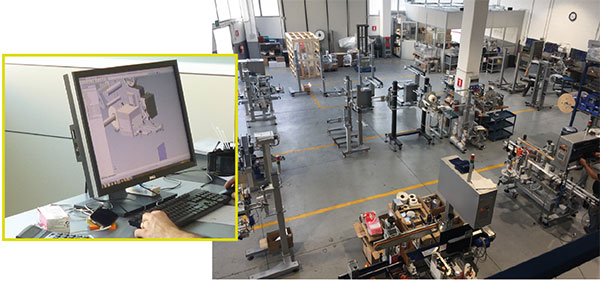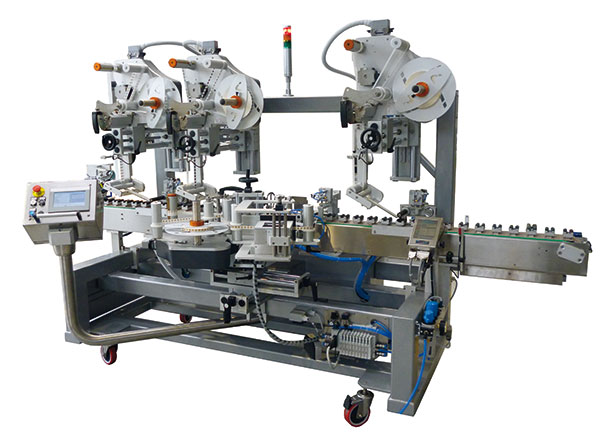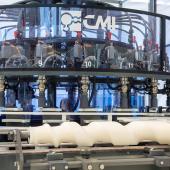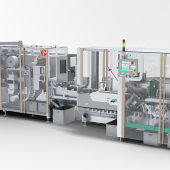Made in Italy labeling
Responding to evolving labeling needs with cutting-edge technological solutions and impeccable customer care: this is Labelpack. L.G.

First founded in 1992 with a mission to develop automatic solutions for printing and applying labels with barcodes and variable text, after ten years Labelpack expanded its activities to also include the design and production of labeling machines and automatic labeling systems.
Today, after 25 years in business, it is a solid enterprise headed by Maurizio Biella, with a clear vision of its own potential and target market, which it approaches with appropriate tools and strategies. Evidence of this is the decision in 2015 to create two separate but synergic companies: Labelpack Trade Srl and Labelpack Manufacturing Srl. The former promotes and markets all Labelpack brand systems both in Italy and internationally, while the latter designs and manufactures automatic and semi-automatic labeling solutions and print & apply systems. Giuseppe Mosca (the company’s head of sales and marketing) recounts the company’s path of growth and its short-term goals for development and the market.

Rational concepts and projects
«The world of labeling is a strange and complex one, because the variables on which we manufacturers are called upon to act are endless: numerous materials and product formats... We need to take into account performance and speeds that are always different, as well as the most disparate application, control and printing conditions... But it is precisely this need to confront situations that are in a certain sense “composite” that pushes us to further enhance our machines’ construction in order to simplify their production and thereby be able to count on greater standardization.
At the moment, Labelpack produces numerous “basic labeler” models, but in the immediate future we intend to focus on one or two products at most, ensuring that they are able to meet all performance requirements. We will thus create very flexible machines that are easy to assemble and manufacture, and even easier to personalize. In other words: less complexity with greater efficiency for latest-generation systems, which we expect to finalize during 2018 and preview at Ipack-Ima».

Labelpack’s goal of rationalizing production is also realized through the implementation of Industry 4.0 principles: «The future of machines will be decided in electronics - Mosca has no doubts on the subject - and labeling and coding systems in particular will have to be increasingly capable of facilitating factory connectivity (see the box on application of the Modular system, Editor’s note). Today, moreover, many of our models are already configured for linking with other machines or with business management software and allow installation of a vast array of control and vision systems for line and process monitoring: we plan to make this a standard feature across our entire product range».
In service, Labelpack is also moving with determination when it comes to another issue affecting the entire manufacturing sector, namely predictive maintenance: «We are thinking about labeling and coding systems capable of “self-monitoring” by supplying accurate information on scheduling and methods of assistance, offering our users a real support that is all the more useful wherever the in-house maintenance service lacks the necessary qualifications».

Make-up 4.0 labeling
The Modular and Master labeling series feature as the high technology content range developed by Labelpack during the last years.
Designed and made with modularity criteria to better respond to the different needs of the market and assembled with the striking cantilevered structure, they are a concrete response to the needs of the cosmetic industry, in particular for labels for make-up products.
Modular WR-OS have been devised for the application of multiple labels in preset positions on “unstable” cosmetic containers (this is the case for mascara, lip-gloss and lipsticks). The product is oriented in the right direction by a rotational device with camera that can read the print on the container. In the first station the barcode label is applied and subsequently the waterproof stamp. In the third station the side stamp is applied to the label/base of the product and, lastly, the transparent label as a guarantee seal. The system is governed by a PLC with touchscreen operator interface, where all the setting parameters are memorised for each type of product and label to be applied, complete with Ethernet connection for the running of the remote service. The conveying system using magnetic fixing templates enables containers of all shapes and sizes to be managed with the greatest flexibility.
The market today and tomorrow
Labelpack’s history has always been marked by certain constants: «The pursuit of product quality and an attention to acquisition and operational costs - explains Mosca - have been two decisive factors for the success of our machines around the world, even during times of recession. Today we count 36 partners in 22 countries, and we are also doing very well in East Asia, where we have concluded trade deals for the distribution of our labelers in Indonesia, Thailand, Vietnam, China and others. That is because, even in these regions, users have shown that they value Made in Italy products, in spite of the consistently fierce competition of local manufacturers, which is more often than not a matter of price».
In order to accommodate its growth in scale and in turnover, Labelpack decided in 2014 to invest in a new headquarters, much larger than the previous one: «We still have easy access to Milan, having moved from Cinisello Balsamo to Brugherio, and the move has had an enormous influence on the life of the company by offering us opportunities for rationalizing and consolidating commercial and administrative operations, but also development, production and logistics. Furthermore, by hiring qualified professionals to manage sales on the domestic and foreign markets, back office figures, a new designer and other production technicians, we have undertaken a major investment in human resources, which is a vital element for a concern such as ours, tasked with developing technology, even though - Mosca adds with a hint of resignation - finding qualified technicians is a laborious process».
Already the Brugherio site appears to be not enough, considering the firm’s growing turnover and high expectations for the future. Might Labelpack be planning another change soon? While it focuses on developing a new generation of labelers, the ownership is certain to make the right decisions to guarantee the continuity and success of the business.

















